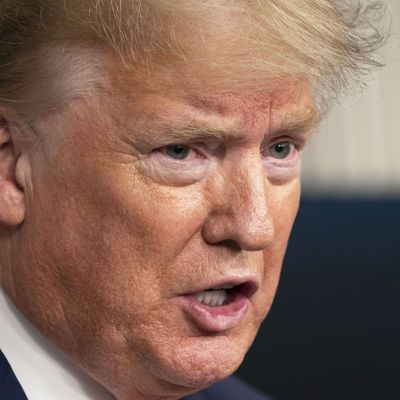
President Trump has two basic modes of governing: abnegation and abuse. Throughout the coronavirus pandemic, Trump has alternately — and, at times, simultaneously — claimed absolute authority and zero responsibility for the crisis. On Thursday, he seemed to lurch back toward abnegation, telling governors they could “call their own shots” about when to reopen public spaces, and they are also “going to lead the testing.”
Today, he is lurching back toward abuse. In a series of wild, all-caps tweets, he called for unspecified revolutionary activity against three states with Democratic governors:
The source of Trump’s peripatetic swings is his inability to competently manage the pandemic. He wants to ease up on social-distancing rules soon, but public-health officials have unanimously insisted that doing so requires an effective testing system. (Otherwise, those states could be vulnerable to new outbreaks that could spread before state authorities have the chance to stop them.) But despite Trump’s absurd lies that the United States has the best tests in the world, and that other countries are trying to copy our tests, the testing system has been in a state of shambles all along.
That failure necessitated his decision yesterday to throw all responsibility to the states. Administration officials tell the Washington Post this posture “is largely designed to shield himself from blame should there be new outbreaks after states reopen or for other problems.”
Only political desperation could account for this “strategy.” The federal government has several innate advantages over the states in responding to a national pandemic. First, Washington has a large, specialized bureaucracy for handling public-health and disaster management (think the CDC, NIH, FEMA, Department of Homeland Security). Scientists are still racing to understand basic facts about the novel coronavirus, and the concentration of national (and international) medical expertise is a distinct advantage.
Second, the national government has the ability to allocate resources where they’re needed. It would make no sense to have every state devise its own defenses against a foreign invasion. (If the enemy lands all its forces in, say, Georgia, you would want to concentrate the defense there, rather than having each governor defend territory that hasn’t been invaded.) Likewise, it makes no sense for every state to mobilize against a pandemic disease that is bound to strike some states much harder than others.
Third, states are required to balance their budgets annually, while Washington can borrow almost without limit. This is the most important reason why Trump’s states-first posture is so irrational. The recession is throwing states into a fiscal crisis, as their revenue stream dries up and more people need social services.
What makes it especially irrational is that Trump’s Republican partners are obstinately opposing federal fiscal aid for state governments. If we take as a given that Trump’s administration is hopelessly inept, it might make sense as a desperation measure to let the governors handle everything on their own. But there is no world in which it makes sense to devolve authority to the states and then let the states collapse into fiscal ruin.
It is not only irrational from the standpoint of the national interest, but it is irrational from the standpoint of Trump’s political interest. The president wants and needs states to reopen their economies as quickly as possible. They can’t do that without having measures in place to flag and contain new coronavirus outbreaks.
Rather than either accelerating the federal government’s production of coronavirus testing or giving states fiscal room to handle it themselves, Trump is doing neither. He is promoting anti-social-distancing protests against Democratic governors as a blunt weapon to compensate for his managerial incompetence. If he cannot provide the conditions to allow states to relax social distancing while following public-health guidelines, he will try to force them by whipping up angry mobs.
There is nothing remotely strategic about this course of action. Polls show the governors he is attacking, and the social-distancing measures they are currently enforcing, are popular. Trump is fomenting anarchy in his own country, undermining the prospects for the orderly recovery he needs in order to win reelection, and creating the risk of a violent tragedy. (The Confederate-flag-waving protesters blocking the entrance to a hospital in Michigan yesterday is the sort of episode that, if repeated, could go very badly.) He is raging angrily against the system because he is hopelessly out of his depth.






























